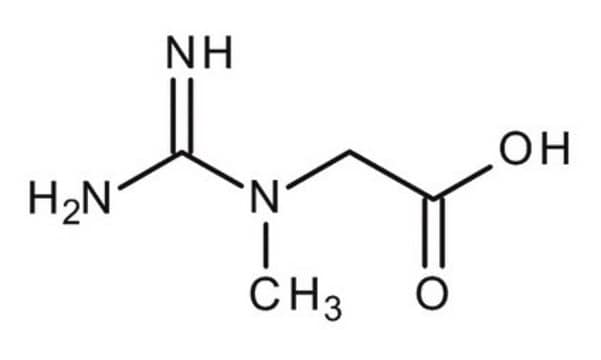C3630
Creatine monohydrate
≥98%, suitable for cell culture
Sinónimos:
Creatine hydrate, Creatine, monohydrate, N-(aminoiminomethyl)-N-methyl-glycine hydrate
About This Item
Productos recomendados
product name
Creatine monohydrate, ≥98%
Análisis
≥98%
formulario
powder
técnicas
cell culture | mammalian: suitable
color
white to off-white
mp
292 °C
cadena SMILES
O.CN(CC(O)=O)C(N)=N
InChI
1S/C4H9N3O2.H2O/c1-7(4(5)6)2-3(8)9;/h2H2,1H3,(H3,5,6)(H,8,9);1H2
Clave InChI
MEJYXFHCRXAUIL-UHFFFAOYSA-N
¿Está buscando productos similares? Visita Guía de comparación de productos
Categorías relacionadas
Aplicación
Acciones bioquímicas o fisiológicas
Código de clase de almacenamiento
11 - Combustible Solids
Clase de riesgo para el agua (WGK)
WGK 3
Punto de inflamabilidad (°F)
Not applicable
Punto de inflamabilidad (°C)
Not applicable
Equipo de protección personal
dust mask type N95 (US), Eyeshields, Gloves
Certificados de análisis (COA)
Busque Certificados de análisis (COA) introduciendo el número de lote del producto. Los números de lote se encuentran en la etiqueta del producto después de las palabras «Lot» o «Batch»
¿Ya tiene este producto?
Encuentre la documentación para los productos que ha comprado recientemente en la Biblioteca de documentos.
Los clientes también vieron
Nuestro equipo de científicos tiene experiencia en todas las áreas de investigación: Ciencias de la vida, Ciencia de los materiales, Síntesis química, Cromatografía, Analítica y muchas otras.
Póngase en contacto con el Servicio técnico










